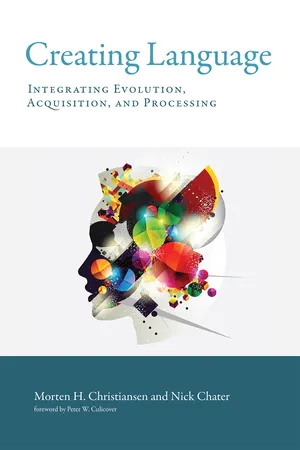
Creating Language
Integrating Evolution, Acquisition, and Processing
- English
- ePUB (mobile friendly)
- Available on iOS & Android
Creating Language
Integrating Evolution, Acquisition, and Processing
About this book
Language is a hallmark of the human species; the flexibility and unbounded expressivity of our linguistic abilities is unique in the biological world. In this book, Morten Christiansen and Nick Chater argue that to understand this astonishing phenomenon, we must consider how language is created: moment by moment, in the generation and understanding of individual utterances; year by year, as new language learners acquire language skills; and generation by generation, as languages change, split, and fuse through the processes of cultural evolution. Christiansen and Chater propose a revolutionary new framework for understanding the evolution, acquisition, and processing of language, offering an integrated theory of how language creation is intertwined across these multiple timescales.
Christiansen and Chater argue that mainstream generative approaches to language do not provide compelling accounts of language evolution, acquisition, and processing. Their own account draws on important developments from across the language sciences, including statistical natural language processing, learnability theory, computational modeling, and psycholinguistic experiments with children and adults. Christiansen and Chater also consider some of the major implications of their theoretical approach for our understanding of how language works, offering alternative accounts of specific aspects of language, including the structure of the vocabulary, the importance of experience in language processing, and the nature of recursive linguistic structure.
Tools to learn more effectively

Saving Books

Keyword Search

Annotating Text

Listen to it instead
Information
Table of contents
- Cover
- Title page
- Copyright page
- Table of Contents
- Foreword
- Preface
- I Theoretical and Empirical Foundations
- II Implications for the Nature of Language
- References
- Name Index
- Subject Index
Frequently asked questions
- Essential is ideal for learners and professionals who enjoy exploring a wide range of subjects. Access the Essential Library with 800,000+ trusted titles and best-sellers across business, personal growth, and the humanities. Includes unlimited reading time and Standard Read Aloud voice.
- Complete: Perfect for advanced learners and researchers needing full, unrestricted access. Unlock 1.4M+ books across hundreds of subjects, including academic and specialized titles. The Complete Plan also includes advanced features like Premium Read Aloud and Research Assistant.
Please note we cannot support devices running on iOS 13 and Android 7 or earlier. Learn more about using the app